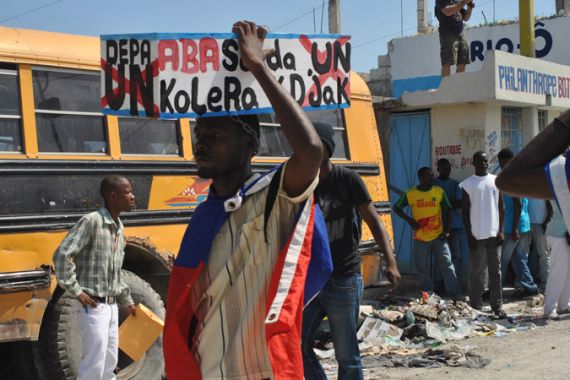UN hit with cash demand over Haiti cholera
Petition made on behalf of more than 5,000 victims of outbreak allegedly caused by infected peacekeepers from Nepal.

The United Nations has been hit with a demand for hundreds of millions of dollars in reparations because of a year-old cholera outbreak that has killed more than 6,700 Haitians.
The demand was made on Tuesday on behalf of more than 5,000 Haitian cholera victims and their families in a petition filed at UN headquarters in New York by the Boston-based Institute for Justice and Democracy in Haiti.
Keep reading
list of 4 itemsCanada wildfires spur evacuation orders, warnings: What you need to know
Evacuation orders issued as wildfire grows near Canada’s Alberta oil patch
Energy summit seeks to curb cooking habits that kill millions every year
The human rights group said the peacekeeping soldiers were not adequately screened by the United Nations.
The human rights group argues that infected UN peacekeeping troops from Nepal, where cholera is endemic, caused the outbreak by dumping untreated waste from their rural base camp into a tributary of the most important river in the earthquake-ravaged Caribbean nation.
“The cholera outbreak is directly attributable to the negligence, gross negligence, recklessness and deliberate indifference for the health and lives of Haiti’s citizens by the United Nations and its subsidiary, the United Nations Stabilization Mission in Haiti (MINUSTAH),” the petition said.
It said numerous studies, including those by the UN, traced the virus to UN personnel from Nepal.
“Until MINUSTAH’s actions incited the cholera outbreak, Haiti had not reported a single case of cholera for over 50 years,” the petition said.
The petition sought a minimum of $100,000 to compensate the families or next-of-kin of each of the individuals who lost their lives to the deadly epidemic. It also demands at least $50,000 to compensate each victim who suffered illness or injury from cholera.
Claim disputed
UN spokesman Martin Nesirky told reporters he disputed the claim of UN responsibility for the cholera in Haiti. He said the peacekeeping mission and other agencies were working to control the spread of the disease and treat it.
He said Ban Ki-moon, the UN Secretary-General, had appointed a panel of independent scientists to study the cause of the epidemic.
But the panel, which issued its report in May, “determined that it was not possible to be conclusive about how cholera was introduced into Haiti,” Nesirky said.
Close to half a million Haitians out of a population of more than 9.5 million have been sickened by cholera since the outbreak began in October last year and more than 6,700 have died. The cholera started nine months after a 2010 earthquake wrecked the capital Port-au-Prince, killing tens of thousands and leaving many more homeless.
Cholera is a water-borne disease transmitted when bacteria-contaminated human fecal matter gets into water, food or onto someone’s hands. It can cause severe diarrhea and vomiting and kill within hours by dehydrating victims.